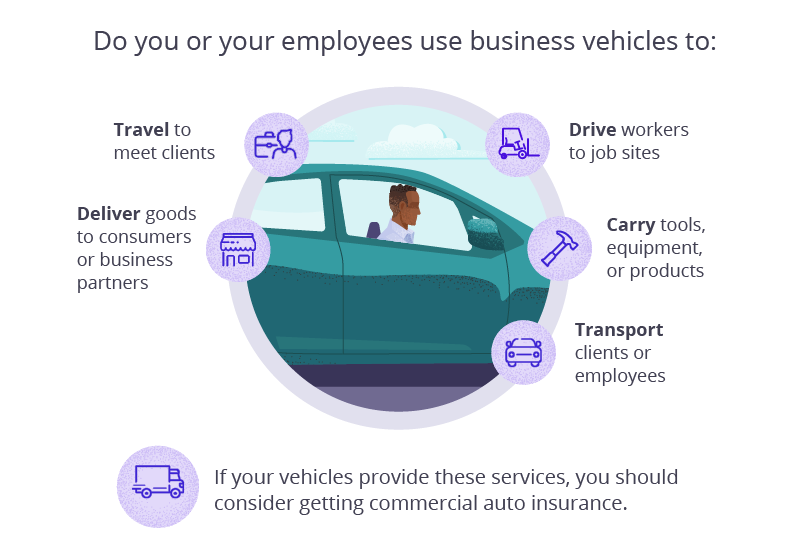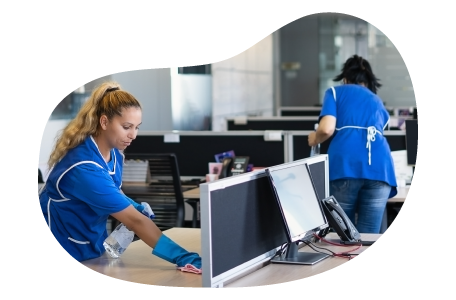
Commercial auto insurance for cleaners
Commercial auto insurance covers legal bills, medical expenses, and property damage if your cleaning business vehicle is involved in an accident.
Commercial auto insurance protects the vehicles you depend on
Your employees rely on your cleaning company's vehicles to travel to clients. But if an employee gets into an accident, it could lead to much more than missed work. A lawsuit over an auto accident could cost your business a fortune in legal bills or a settlement, especially if another person is injured.
The average premium for commercial auto insurance is $173 per month for a cleaning business. Compared to the cost of a court battle, it's easy to see which is the better deal.
How does commercial auto insurance protect you?
Commercial auto insurance helps cover many costs related to a car accident, such as property damage, medical bills, lawsuits, and other expenses. It can also pay for vehicle theft, as well as repairs due to vandalism and weather damage.
Your policy can be tailored to match your business. For instance, a pool cleaning business that only works with customers in a 15-mile radius may require less coverage than a septic tank cleaning company that operates in a rural area with long drive times between clients.

Who needs commercial auto insurance?
Company-owned vehicles such as window cleaning trucks and janitorial services vans must be covered by commercial auto insurance. State regulations determine how much coverage you need.
Your window cleaning van insurance must meet your state’s liability insurance requirements.
Find commercial auto insurance requirements in your state

What coverage can commercial auto provide for cleaning businesses?
You can tailor your commercial auto insurance policy to match the needs of your pressure washing business or other cleaning business. Your policy may cover:
Legal costs
If your cleaning business is sued over an accident, legal defense fees can add up quickly. You could also end up having to pay a settlement or court-ordered judgment if you lose the case.
Medical expenses
If someone is injured in an accident involving your cleaning company's vehicle, commercial auto insurance can help pay their medical costs if they hold your company accountable.
Collision
Collision coverage pays for damage to your house cleaning van or other work vehicle, regardless of who is at fault.
Uninsured motorists
This coverage pays for damage caused by drivers who don’t have insurance.
Non-collision damages
Comprehensive insurance covers non-collision damages including vandalism, theft, and fire.

Personal vehicles may need additional coverage
Commercial auto insurance only covers business-owned vehicles, but sometimes employees drive their own cars for business errands. Personal auto policies almost always exclude coverage for business use.
Hired and non-owned auto insurance (HNOA) provides liability coverage for cleaning professionals who get into an accident while driving their own vehicle to conduct company business. It also covers leased and rented vehicles.
Read more about the differences between commercial auto and HNOA insurance.
How much does commercial auto insurance for cleaning businesses cost?

Cleaning businesses pay an average of $173 per month, or $2,075 annually, for commercial auto insurance.
Insurance costs for cleaning professionals are based on a few factors, including:
- Services offered, such as maid services or carpet cleaning
- Business equipment and property
- Revenue
- Location
- Number of employees
- Policy limits
- Claims history
Other important insurance policies to consider
While commercial auto insurance is a must-have for small businesses that depend on a vehicle to transport cleaning equipment to clients’ homes and businesses, it does not cover risks beyond those related to your vehicle.
Cleaning professionals should also consider:
General liability insurance: This policy helps pay for expenses related to third-party accidents, like a client slipping on a wet floor after you mop. Your clients may require this type of insurance in their contracts or your landlord might require it to sign a lease.
Workers’ compensation insurance: This policy is required in most states for businesses that have employees. It can cover medical expenses if an employee is injured on the job. For example, if a window cleaner falls off a ladder and has a concussion, workers’ comp can pay for medical bills as well as partial lost wages.
Business owner's policy: A business owner's policy, or BOP, combines general liability insurance with commercial property insurance at a discount. Small, low-risk cleaning businesses are usually eligible. Small businesses can often add inland marine insurance to their BOP to protect cleaning equipment they bring to different job sites.
Commercial umbrella insurance: This policy boosts the coverage limits on your general liability insurance, commercial auto insurance, and employer's liability insurance. Cleaning businesses might need it to fulfill requirements for higher policy limits.
Janitorial bonds: Also known as employee dishonesty bonds, janitorial bonds protect your business against employee theft of client property. Many clients won’t hire a cleaning business that doesn’t have this coverage.
Get free commercial auto insurance quotes with Insureon
Are you ready to safeguard your cleaning company's car, truck, or van with commercial auto insurance? Complete Insureon’s easy online application to compare quotes from top U.S. insurance companies.
Once you find the cleaning business insurance policies that fit your needs, you can begin coverage and get a certificate of insurance in less than 24 hours.







